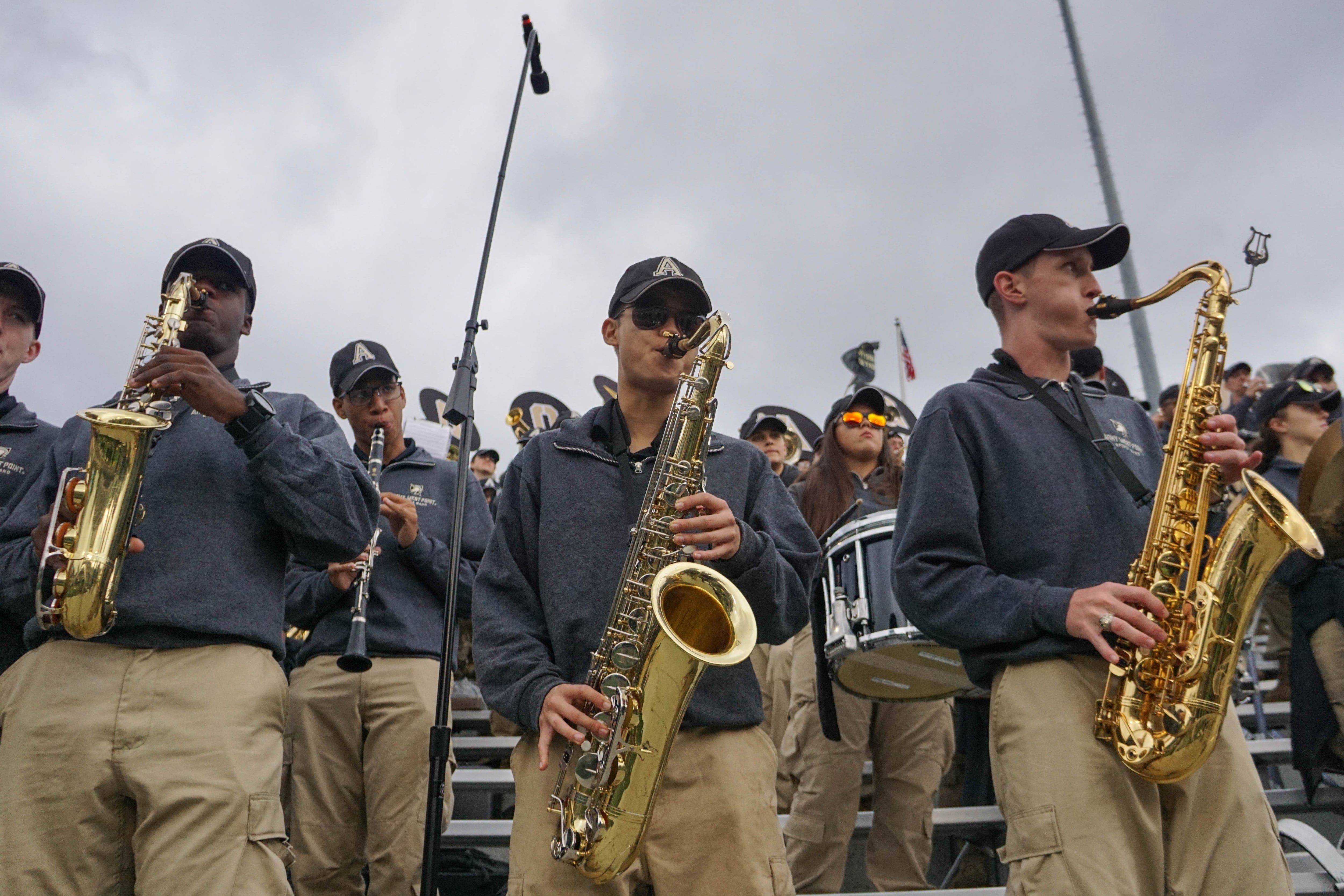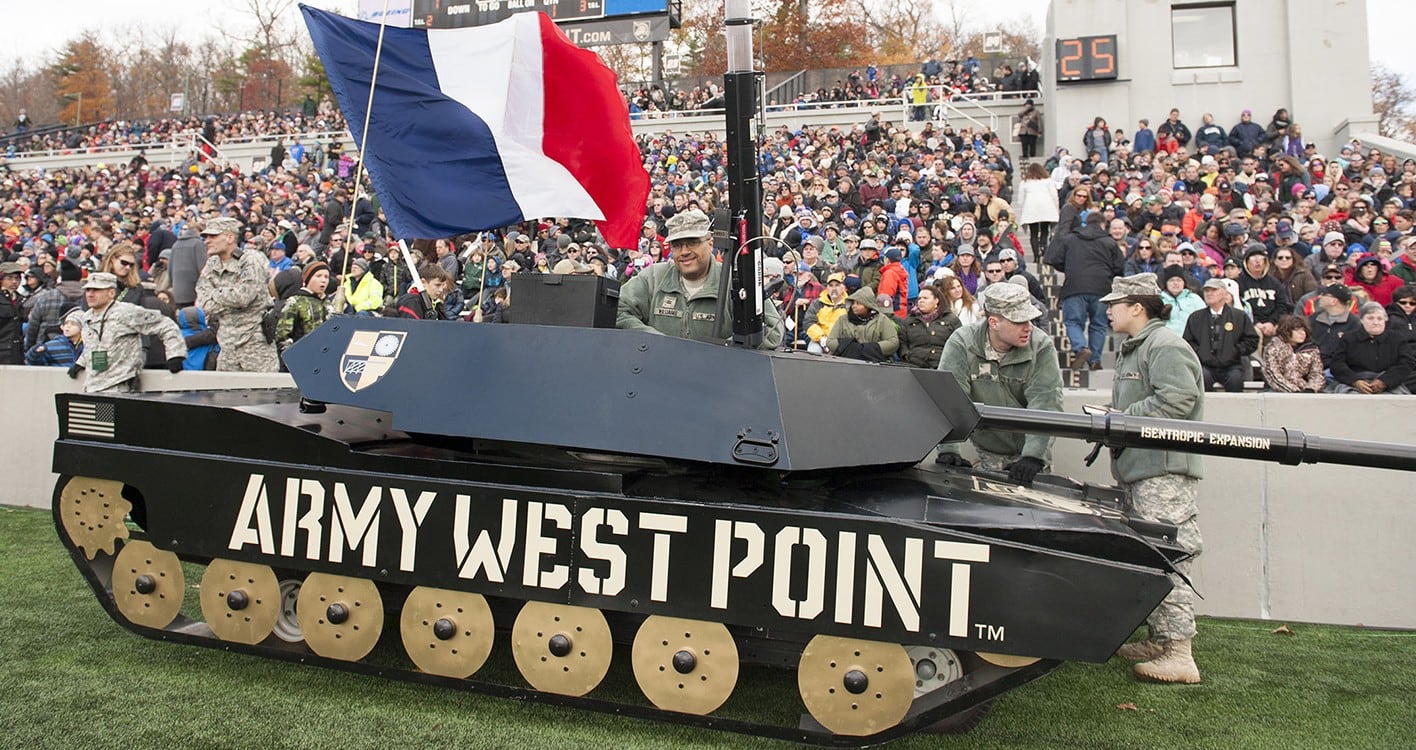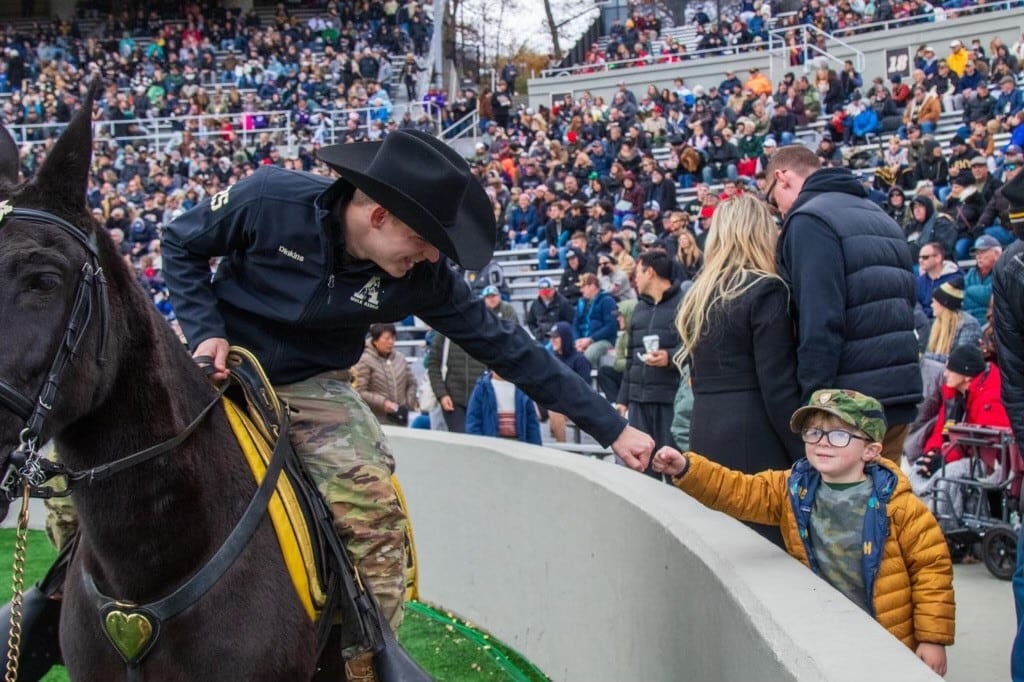Everybody tunes in for the annual Army-Navy game to see the cadets and midshipmen gridiron gladiators collide on the field. But without the cast of mascots, bands and various supporting casts, the game just wouldn’t have the same magic.
Army Times interviewed a handful of the cadets who spend their precious free time carrying on age-old traditions while bringing school spirit, excitement and pageantry to the field, sidelines and stands.
Mule Riders
Cadet Coleman Dinkins, class of 2024 and a Jackson, Mississippi native, learned about the historic Mule Riders from Bryan Paarmann, class of 1988 and his father’s best friend in high school.
The team includes at least one member from each current cadet class. Every afternoon during the week the groom the animals and ride them for 45 minutes or more. After riding, the crew cleans and feeds the animals and then completes any necessary mule-related chores such as refilling hay stalls or cleaning saddles.
On football game weekends they continue their daily practice, including Saturday. The crew also transports the mules to the games, cleaning and maintaining the transport trailer.
For game day, the riders arrive at the stables at 6:30 a.m., go over specifics for that day’s game, then ride the mules for about 20 minutes, to shake off any excess energy, depending on how the mule is feeling. They then wash the mules and blanket them for warmth. The team loads all of the tack, or gear, into the trailer, then the mules and brings them to an area near the stadium to put on the final touches – saddle, general pad, bridle and breastplate. Following some last minute grooming they ensure that the plebe, or first year, cadet on the crew follows behind the pair with the mule’s manure bucket, which they call the “Navy Think Tank.”
Training and riding the mules is no simple task. The four-cadet team is in charge of two mules. A new mule joined the team last year, Ranger IV. The cadets must train new mules for a unique role. That includes conditioning them to the loud bangs of the cannons, helicopters flying overhead, the audience roar and crowded sidelines. Even cheerleaders shaking pom-poms can disturb the animals.
And the mules draw fans. Whether that’s actor Bill Murray or small kids asking the same questions he’s answered all day. But Dinkins doesn’t mind.
“I love seeing the joy in everyone’s eyes when they feel noticed by someone they often believe is too busy to focus on one conversation at a time,” Dinkins said. “My job is as engaging as I make it, and I love engaging with every person I can as it gives me great exposure to people from so many different walks of life.”
Spirit Band
Cadet Cameron Riddle, class of 2024, is the Cadet in Charge and President of the West Point Spirit Band. The Plymouth, Indiana native wanted to pair his love of music and sports while attending the academy and saw the spirit band as the perfect choice.
Riddle has been on the Spirit Band all four years at the academy, serving as a cymbal player in the drum line. That hard work paid off when he was elected Spirit Band president for his senior year.
The band practices Tuesday and Thursday evenings, playing at all home games, other related events and some allotted away games. Riddle played in a high school spirit band and learned of the West Point band from cadets in his company during his freshman year.
“I am thankful that I took the advice of my peers and tried out,” Riddle said. “It has been a blessing.”
The Army-Navy game culminates a season of performances for the band and, Riddle said, gives the group a chance to showcase their abilities at a national level. The members conduct a “drumline battle” against their Navy opponents and play the school’s song “Alma Mater” at the end of the game. If the West Point Black Knights football team wins, the band has the honor to play last, a fitting way to end the season.

Tank Crew
Cadet Jackson Dean, class of 2024, serves as the Tank Crew Cadet in Charge for West Point. The Spokane, Washington native was invited by an upperclassman in his company to join the crew.
“He explained that in Tank Crew you shoot T-shirts, interact with fans, and get the crowd excited,” Dean said. “This sounded like it could be a fun activity to do.”
Dean and his crew spend the pregame hand-rolling T-shirts to fit into their air cannons, filling air tanks and checking the tank-mounted cannon device.
The “tank” is built on a 1990 Columbia Utilitruck. The aging vehicle has its share of maintenance problems. Dean envisions cadets one day having a vehicle like the University of Oklahoma’s Sooner Schooner, a horse-drawn wagon, but motorized so that they could drive onto the field after touchdowns to fire T-shirts to the crowd. But for now, cadets do have the use of Polaris MRZRs to transport their equipment to the field and engage with fans. The MRZR is a currently fielded ultralight tactical field vehicle in use by some Marine Corps and Army units.
While most fans notice the air cannons launching T-shirts in the crowd, the bulk of the crew’s work is transporting and maintaining the air tank vehicle.

Running the tank in front of large crowds puts a lot of pressure on the crew.
The Tank Crew must have 100% of their equipment fully functional come game day, 70,000 people are watching including VIPs such as generals, the secretary of defense and sometimes the President, which leaves little room for error, he said.
Despite the extra work, it’s a job Dean’s happy to do.
“I love riding around in the tank,” he said. “You just bring joy to so many people, their face lights up when they see the tank driving by them.”
Todd South has written about crime, courts, government and the military for multiple publications since 2004 and was named a 2014 Pulitzer finalist for a co-written project on witness intimidation. Todd is a Marine veteran of the Iraq War.





